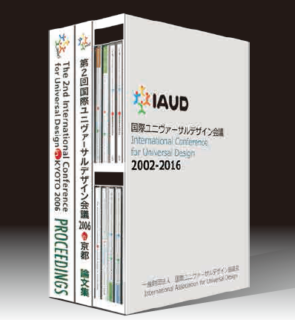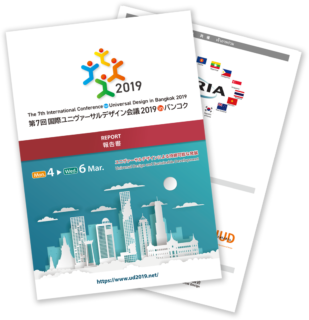2025.05.29
The 3rd International Conference for Universal Design 2010 in Hamamatsu Flash Report (Final Day)
2010.11.05 Updated
As meaningful discussions covering broad areas continue, the conference has now come to its final day.
Public Holiday, Wednesday, November 3
Following the Plenary Session, the Declaration of the International Conference for Universal Design in Hamamatsu 2010 was announced at the closing ceremony, bringing to completion all of the program activities over five days. A total of 1,500 registered participants (including the open symposium) attended the conference from 38 countries and regions. About 12,610 people also visited the exhibition venue, bringing the total number of attendants and visitors to 14,110, approximately the same as the previous conference (with a total of 14,700 people). We wish to extend our sincere appreciation to all of those who were involved with the conference in various capacities and helped to enliven the conference activities.
As stated in the declaration, whether or not this conference is ultimately successful will depend on whether all participants will take back with them to their countries and regions details of discussions and the passionate feeling they experienced at the conference, and be able to link these to practice through specific actions. We hope the knowledge and awareness you gained at this conference will help in some small way to bring us closer to a UD society.
Panel Discussion and Plenary Session
Significance of the user participation type design workshop and future prospective
The UD workshop organized by IAUD since 2004 was renamed “The 48 Hour Marathon for Universal Design”in 2006, and this year was the sixth anniversary of the event. The workshop-style session, in which users with impairments participate from the development stage, has continuously improved with each conference. Those in charge of onsite management, supervisors, observers, and users from each viewpoint discussed the significance of the workshop and the history of improvements in processes, and exchanged opinions about the possibilities of future development.
Panelists
Mr. Akiya spoke about the outcomes, program details, and the history of improvement in process and management methods based on his personal involvement in the planning and management of the workshop as the person in charge of onsite management.
From his perspective as a supervisor, Mr. Arai spoke about the significance of the user-participating type UD workshop and its future prospects.
Focusing on the design projects at the Helen Hamlyn Center Ms. Cassim introduced examples of UD workshop activities all over the world.
From the perspective of a user, Ms. Ohta spoke about her first overwhelming experience participating in the 48-Hour Marathon for Universal Design at the International Conference for Universal Design in Kyoto 2006, and then spoke about her subsequent involvement in UD workshop projects. She noted that users participating in the workshops need to be “competent in assessing, communicating and making proposals.”
Coordinator
Hiromi Fujii (Department Manager, Universal Design and Brand Strategy Office, Marketing Division, NEC Corporation)
Panel Discussion and Plenary Session
Management of Social Design
This session was planned as a collaboration with Design & Business Study Network of Japan Society of Kansei Engineering to explore the relationship and meaning of design in management innovation. Areas of discussion focused on business management and design management from the viewpoint of social design including the concept of UD, sustainable design and social marketing.
Coordinator
Ryozo Takegawa (President, Thinka Design / Former President, Kenwood Design Corp.: Japan)
Mr. Takegawa noted that it is important to see the current conditions in Japan as a business opportunity, and to offer sensitivity value by engaging designers based on the viewpoint of MOD (Management of Design).
Panelists
Mr. Kawarabayashi sees universal design at Bauhaus as the origin of UD, and proposed a new image of designer as the facilitator of user-participant style design processes and social innovation.
Mr. Wada has been involved in the training of engineers with design sense at an engineering-oriented school, and commented about the possibility of developing the service industry by utilizing design know-how for people with disabilities.
Mr. Kawaguchi pointed out that business managers lack an understanding of design, and while the focus of business is said to have shifted from product-based economy to a service-based economy, if all designers focus on the service side, aspects such as color and shape may decline. Mr. Kawaguchi warned that perhaps businesses are rushing too much in one direction.
Universal Design in Management
Mr. Kawaguchi went on to say that UD had gone beyond the issue of design management, and that management issues were important today. He asked about what managerial problems exist in management innovation and industrial revitalization and, as important management issues, how we should go about solving them. He also stated that we must determine the direction of management from the perspective of social business and social responsibility, in order to contribute to the peaceful development of Japan and the world in the future.
Panelists
Mr. Yamamoto talked about the history of IAUD and the future prospects of UD and expectations for business managers.
After elaborating on his pet theory about elements in Japanese culture that form the basis of UD, Mr. Toda further elaborated on his views of UD in the manufacturing sector. He also recommended that business managers experience simulated living situations of the aged.
In the past Mr. Narikawa was involved in initiatives to promote to customers the effective use of electricity, as a means of selling “a formless product” and using words like “universal service” in the days before UD. From the standpoint of neither user nor manufacturer, Mr. Narikawa spoke of ways of proposing ideas to manufacturers from the viewpoint of the user.
Coordinator
Keiji Kawahara (Executive Director, IAUD / Professor, Graduate School, Nagoya University of Arts and Sciences)
Mr. Kawahara threw out some questions to the panelists concerning viewpoints and approaches managers will require as managers of the future, and as to how they will respond to diversity as business managers.
Summing Up Session / Plenary Session
Message to the Future Generation
Speakers
Mr. Higgins concluded by quoting an Italian philosopher, “An ideology must be optimistic. If one dislikes realism, one needs a realism with hope.”
Ms. Fletcher commented on the importance of the role of the Convention on the Human Rights of Persons with Disabilities in protecting the human rights of persons with disabilities, and said that she hoped to see an increase in the number of countries signing and ratifying the Convention and the impact it would have. Commenting on the significance of the UD contest for children, she also emphasized how important it was for children to understand the role they themselves can play and how they need to depend on each other.
Mr. Coleman described how the UD concept developed over the past 12 years since it was introduced to Japan. Introducing the works of Victor Papanek, he talked about design for the future generation, the world today’s young people will be living in, and how to make these young people who are now enjoying their youth think about caring for the aged. He said that this is an important issue.
Mr. Narikawa remarked how surprised he was again and how enlightening it was to note the impressive diversity of UD initiatives, which had become even more global and covered broader areas than in the past. These included not only product design but also perspectives of management, politics, government issues, education, and schools.
Coordinator
Kenji Kawahara (Executive Director, IAUD / Professor of Graduate School, Nagoya University of Arts and Sciences: Japan)
Kenji Kawahara commented that the answers to our questions can already be found in the books of Victor Papanek. He said that he fully agreed with the description of Papanek as not only a specialist but as a person with “the wisdom of a throng.” The light has already been turned, he said, so we must start taking action now for the future.
Review of the “48-Hour Marathon for Universal Design”.
Closing Ceremony
back to 4th Day << Index
Inquiries
Secretariat, International Association for Universal Design
Inquiry Form![]()
Tel: +81-45-901-8420
Fax: +81-45-901-8417
2-13-18-110, Shin-Ishikawa, Aoba-ku, Yokohama 225-0003 Japan








